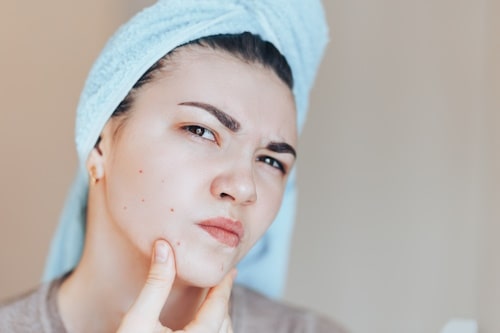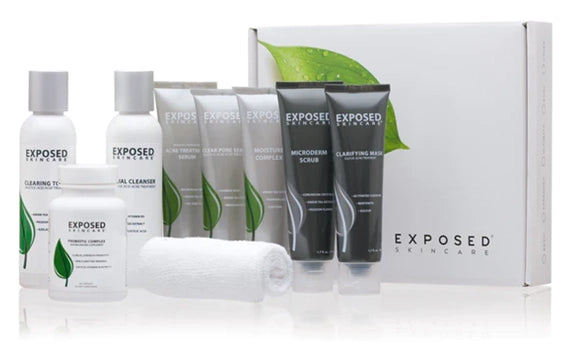The journey through the complex and often underexplored relationship between IBS (Irritable Bowel Syndrome) and acne begins in the most unlikely of places – our gut. The medical communities have been intrigued by the possible connections between gut health and skin conditions for years.
This blog post delves deep into this topic, offering insights into how IBS and acne may be more intertwined than previously thought. Remember that our body is a system of interconnected parts, where issues in one area can manifest as symptoms in another.
Also read: How to choose the best acne treatment
Biggest Take-Aways:
- The gut-skin axis plays a crucial role in conditions like IBS and acne, where gut health significantly impacts skin health.
- Systemic inflammation and imbalances in gut microbiota are key factors in exacerbating skin conditions like acne, psoriasis, and rosacea.
- Dietary modifications, including avoiding trigger foods and including probiotics, can help manage both IBS and related skin issues.
- Exposed Skin Care can be an effective part of a skincare routine, especially for those with acne exacerbated by IBS, due to its targeted, gentle approach and ability to balance skin microbiota.

Understanding the Gut-Skin Axis
The Gut-Skin Connection: More Than Skin-Deep
- A Two-Way Street: The gut-skin axis is the bidirectional relationship between the gastrointestinal (GI) tract and the skin. This connection implies that gut health can significantly impact skin health and vice versa.
- Microbiome and Inflammation: The gut microbiota plays a crucial role in this relationship. An imbalance in gut bacteria can lead to inflammation, manifesting as various skin conditions, including acne and rosacea.
The Role of IBS in Skin Health
- IBS Symptoms and Skin Issues: IBS, characterized by symptoms like bloat, constipation, and cramps, can influence skin health. The chronic inflammation often associated with IBS can exacerbate skin conditions.
- Impact of Dysbiosis: Dysbiosis, or the imbalance of gut bacteria, often seen in IBS, can contribute to skin issues. This imbalance can lead to increased intestinal permeability ('leaky gut'), allowing toxins and bacteria to enter the bloodstream and affect the skin.
IBS and Acne: A Closer Look
Exploring the Connection
- Inflammatory Responses: Both IBS and acne are inflammatory conditions. The systemic inflammation seen in IBS can trigger or exacerbate acne.

- Bacterial Overgrowth: Conditions like SIBO (Small Intestinal Bacterial Overgrowth), often associated with IBS, can also contribute to acne by affecting the balance of gut bacteria.
Digestive Issues and Their Skin Impact
- Poor Digestion and Skin Health: Inefficient digestion in IBS can lead to poor nutrient absorption, crucial for maintaining healthy skin. Deficiencies in certain nutrients can exacerbate acne.
- Toxins and Skin Conditions: Poor digestion can increase toxin levels in the body. These toxins can contribute to skin issues like acne, rosacea, and even atopic dermatitis.
Nutritional Aspects in IBS and Acne
Diet's Role in Gut and Skin Health
- Trigger Foods: Certain foods can trigger IBS symptoms and simultaneously affect the skin. For instance, high-histamine foods may exacerbate both IBS and skin flare-ups.
- Fibre and Digestion: Adequate fiber intake is essential for bowel health and can impact skin conditions. Fiber aids digestion and the elimination of toxins, which can help reduce acne severity.
- Fermented Foods and Probiotics: Incorporating fermented foods and probiotics into the diet may help rebalance the gut microbiota, potentially improving IBS and skin health.
Supplements and Herbal Remedies
- Probiotics and Prebiotics: Probiotics and prebiotics can help rebuild a healthy gut microbiome, which may positively affect skin health.
- Anti-Inflammatory Supplements: Supplements with anti-inflammatory properties, like omega-3 fatty acids found in oily fish, can benefit both IBS and acne.
- Herbal Remedies: Certain herbal supplements may help manage IBS symptoms and could indirectly improve skin health.

Lifestyle Factors in Managing IBS and Acne
Beyond Diet: Holistic Approaches
- Stress Management: Stress can exacerbate both IBS and acne. Engaging in stress-reducing activities like yoga or meditation can be beneficial.
- Physical Activity: Regular exercise can improve gut motility, reduce stress, and help manage IBS and acne.
- Skincare Regimen: While addressing gut health, maintaining a gentle and consistent skincare routine is also crucial in managing acne.
The Impact of Sleep and Hydration
- Quality Sleep: Adequate sleep is essential for gut health and can influence skin health. Poor sleep can exacerbate IBS symptoms and lead to skin issues like acne flare-ups.
- Hydration: Proper hydration aids digestion and can help reduce skin issues. Drinking enough water helps in toxin elimination and maintaining healthy skin.
Understanding Individual Responses
The Need for Personalized Approaches
- Variability in Symptoms and Triggers: Each individual's experience with IBS and acne is unique. Understanding personal triggers is crucial in managing these conditions.
- Customized Dietary Plans: Tailoring dietary intake based on individual tolerances and triggers can be more effective in managing IBS and acne.

The Journey Towards Clearer Skin and Better Gut Health
- Holistic Understanding: Understanding the interplay between gut health and skin conditions is the first step towards managing IBS and acne effectively.
- Continuous Learning and Adjustment: Managing these conditions is an ongoing process, requiring constant learning and adjustment of lifestyle and dietary habits.
IBS and Acne: Towards an Integrated Approach
Combining Gastrointestinal and Dermatological Insights
- Interdisciplinary Understanding: An integrated approach, combining insights from both gastrointestinal and dermatological perspectives, is essential in tackling IBS and acne.
- The Role of Gut Health in Overall Wellbeing: Recognizing the gut's role in overall health, including skin health, is fundamental in managing both IBS and acne.
The Future of IBS and Acne Management
- Emerging Research and Innovations: Ongoing research is continually shedding light on the complex relationship between IBS and acne, opening new avenues for treatment and management.
- Awareness and Education: Increasing awareness and understanding of the gut-skin connection can lead to better management strategies and improved quality of life for those affected by these conditions.
Benefiting from Exposed Skin Care in Managing Acne
Exposed Skin Care has emerged as a notable solution for those grappling with acne, especially when considering the complex interplay between acne and IBS.
Here are some key benefits of Exposed Skin Care:
- Targeted Acne Treatment: Exposed Skin Care products are specifically formulated to combat acne, offering a targeted approach that can be particularly beneficial for those who suffer from IBS and experience acne as a symptom.
- Gentle on Sensitive Skin: The products are known for being gentle. This is crucial since people with IBS can have sensitive skin due to the systemic effects of the syndrome.
- Balancing Skin's Microflora: Just as the balance of microorganisms in the small intestine is crucial for managing IBS, maintaining a healthy skin microbiome is key in treating acne. Exposed Skin Care helps in balancing this delicate ecosystem.
- Reducing Inflammation: Since both acne and IBS involve inflammatory processes, using Exposed Skin Care can help reduce skin inflammation, thereby indirectly alleviating one of the symptoms of IBS that can affect your skin.
By addressing acne through products like Exposed Skin Care, individuals with IBS can find relief not just from skin issues but potentially see an improvement in the overall symptoms of IBS that affect their quality of life.
Conclusion
The intricate relationship between IBS and skin conditions like acne and rosacea reveals the complex interplay within our bodies. IBS can cause a myriad of symptoms, affecting not just the digestive system but also manifesting in skin issues.
The inflammation stemming from IBS can trigger flare-ups in conditions like psoriasis, exacerbated by factors like histamine levels and food sources that trigger allergic reactions. Moreover, the role of the gut in our overall health cannot be overstated.
It functions as a critical organ, not just for the digestion and absorption of nutrients but also for maintaining the balance of our body's systems. This balance is crucial, as poor digestive health can lead to symptoms ranging from uncomfortable stool consistency to more severe reactions like itchy hives or symptoms of rosacea.
The skin, often reflective of our internal health, can become a visual gauge for underlying issues. Products like Exposed Skin Care can offer clarity in our skincare routine, helping to manage acne effectively.
However, it's also essential to look beyond topical solutions and consider dietary modifications and the reintroduction of beneficial foods. This holistic approach can aid in reducing the impact of endotoxins and improve circulation, which are vital for gut and skin health.
For those struggling with IBS-related skin issues and looking for help, it's important to eat a variety of nutrient-rich foods and seek guidance from a GP or specialist.
Addressing these concerns requires a multifaceted approach, acknowledging that what we digest and how our bodies react can significantly influence our skin's health. Remember, managing IBS and its associated skin conditions is a journey of understanding and adapting to our bodies' unique needs.
FAQs
How Does IBS Affect Skin Conditions Like Acne?
IBS can cause systemic inflammation and imbalances in gut bacteria, which may exacerbate skin conditions such as acne and rosacea.
Can Improving Gut Health Help in Reducing Acne?
Yes, improving gut health can significantly impact skin conditions. A healthy gut can reduce inflammation and improve nutrient absorption, which is crucial in managing acne.
Are There Specific Foods That Trigger IBS and Acne?
Yes, certain foods, especially those high in histamine or allergens, can trigger both IBS and acne. Identifying and avoiding these foods can be beneficial.
Is Exposed Skin Care Effective for Acne Linked to IBS?
Exposed Skin Care is formulated to target acne directly and can be particularly beneficial for those whose acne is exacerbated by IBS due to its gentle and balanced approach to skincare.
















